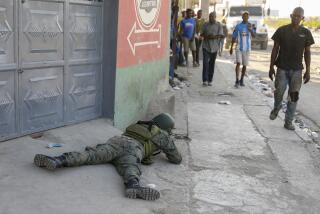PERSPECTIVE ON SOUTH AFRICA : Chris Haniâs âArmyâ Is Key to Peace : Democracy seems inevitable, but the needs of the fallen black leaderâs followers cannot be ignored.
CAPE TOWN â Time will show whether the gunning down of charismatic left-wing leader Chris Hani will speed the process to democracy in South Africa. There is a good chance that it will.
The country is bracing itself for racial unrest--the local equivalent of what happened in parts of the United States after the assassination of Dr. Martin Luther King Jr. and, indeed, the riots that followed the first trial in the Rodney King beating case. Over the weekend, at least three whites were killed and there was growing black militancy in events associated with the Hani killing.
Yet, these immediate horrors notwithstanding, there is reason to believe that Haniâs murder will have a cathartic effect on both whites and blacks, in that it will concentrate the minds of all South Africans to settle their differences before the streets are strewn with the bleeding bodies of their leaders.
There has always been a potential for a Lebanon in this land of racial contrasts and inequalities. That scenario would see significant black and white leaders cut down by assassins if the country headed toward civil war and chaos.
But so far, violence has been mainly localized in regions of Natal and Transvaal provinces--although the death rate nationally is about 10 a day.
This is not to say that political assassination--including that conducted by death squads linked to the white Nationalist government--has been unknown. But this was largely directed against lesser lights and second-rung leadership, and some who were destined to make it to the top, like Steve Biko (beaten to death in detention by police in 1977).
But Haniâs death changes that pattern, and takes the danger of assassination to the inner sanctum of political organizations currently close to a breakthrough in negotiating a democratic order. Calls to radio talk shows have reflected an ominous deterioration in public attitudes, with some whites saying Hani got what he deserved and warning that others might follow, and some militant blacks calling for revenge.
Hani, though a known target for assassination, was refused police protection on the flimsy-sounding grounds that he had no official position in the country. But he was a crucial cog in the peace machinery. The government will now be under immense pressure to protect the lives of those engaged in the delicate and dangerous negotiations.
Hani, though previously known as a hard-line Communist, had increasingly thrown his weight behind the peace effort. His conciliatory stance just before his death, roundly condemning extremist black groups, which have been killing white motorists, has made an indelible impression on public life. His death could galvanize forces for peace and negotiation as could no other event.
This writer saw Hani in 1991 at a press conference in Durban. He came across as eloquent, highly intelligent and a peacemaker. He spoke matter-of-factly about his task as military commander of ANC guerrilla forces in years past. He had a job to do, is how he put it. Now the task was negotiation and peace.
A mark of the respect in which he was held by friends and foes is the deluge of tributes nationally and internationally. He was a person who had risen above the crudity of armed struggle.
Once the demonstrations over his death subside, interest will center on whether the assassination will jolt the main players in negotiations to push ahead, or whether there will be a faltering in momentum. The point is whether non-racial elections will, in fact, be held next year.
There are grounds for believing that the democratization process is irreversible, and that there is no way back to apartheid and repression--unless right-wing military hotheads stage a coup, which would surely be brief and unsuccessful.
So there is no real choice for South Africa but to plod ahead to democracy. The economy requires political reform and stability before it can effectively address rapidly growing unemployment and education, housing and other needs of the masses. And the masses were Haniâs army, whom he could control.
If there is no early political settlement, the economy could regress beyond the point of repair. In that case, the extreme forces, who would dearly tear down the peace barricades and pitch the country into civil and racial war, will inherit that army of the hopeless and unemployed.
Hani was the person most suited to taming the excesses of the masses, particularly the impoverished and embittered youth. And he did this with a gusto and sincerity that surprised many of his opponents. He had made the quantum leap from fostering class revolution to all-around stability. In that sense, his âcommunismâ was far removed from the violent and revolutionary doctrines of that ideology.
Someone else will now have to take on the unenviable task of general secretary of the Communist Party and tamer (or inflamer) of the masses. The future of the country will, largely, depend on whether those masses can play a constructive role in a democratic future; or whether they are whipped up into violence that would rank with Cambodiaâs killing fields.
More to Read
Sign up for Essential California
The most important California stories and recommendations in your inbox every morning.
You may occasionally receive promotional content from the Los Angeles Times.










